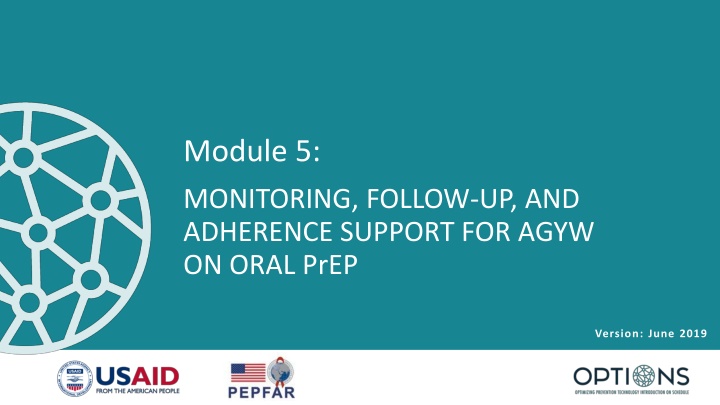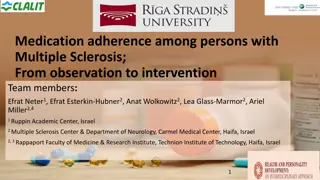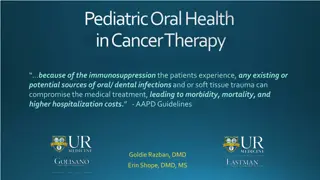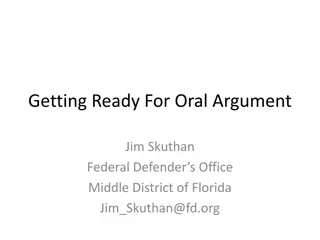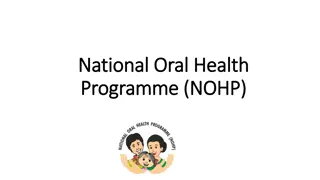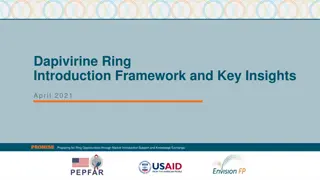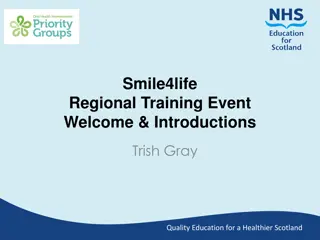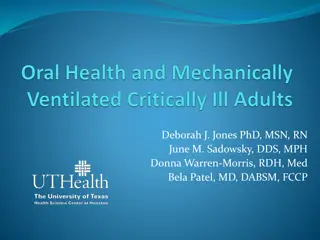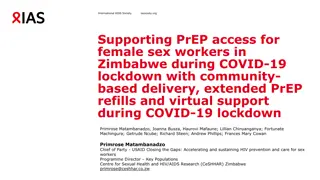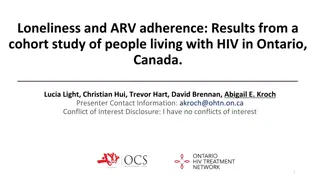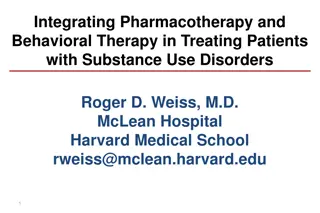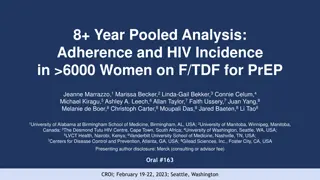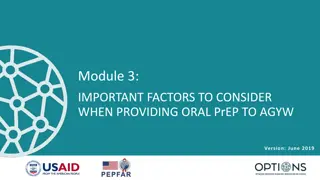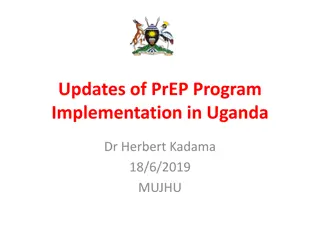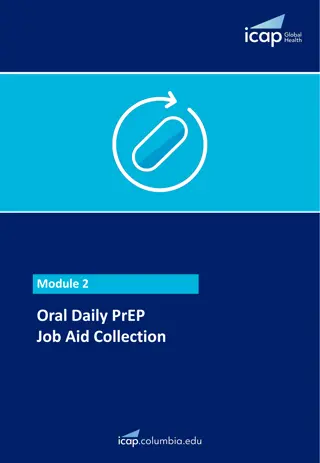Adherence Support for AGYW on Oral PrEP - Module 5 Overview
This module focuses on monitoring, follow-up, and adherence support for adolescent girls and young women (AGYW) using oral PrEP. It highlights the importance of promoting adherence and retention, addressing challenges, integrating services, and ensuring respectful care. Strategies for supporting AGYW in staying on PrEP are discussed, emphasizing the voluntary nature of PrEP initiation and the need for ongoing support.
Download Presentation

Please find below an Image/Link to download the presentation.
The content on the website is provided AS IS for your information and personal use only. It may not be sold, licensed, or shared on other websites without obtaining consent from the author.If you encounter any issues during the download, it is possible that the publisher has removed the file from their server.
You are allowed to download the files provided on this website for personal or commercial use, subject to the condition that they are used lawfully. All files are the property of their respective owners.
The content on the website is provided AS IS for your information and personal use only. It may not be sold, licensed, or shared on other websites without obtaining consent from the author.
E N D
Presentation Transcript
Module 5: MONITORING, FOLLOW-UP, AND ADHERENCE SUPPORT FOR AGYW ON ORAL PrEP Version: June 2019
Outline of training Module 1: Introduction to oral PrEP PrEP: the basics What is combination prevention? How effective is oral PrEP? What are the differences among PrEP, PEP, and ART? Overview of country-specific guidelines Module 4: Oral PrEP provision for AGYW getting started Generating demand: reaching AGYW Risk assessments Addressing myths, misconceptions, and fears Factors influencing decisions to initiate or stay on oral PrEP Key issues to discuss with AGYW in relation to PrEP Module 5: Monitoring, follow-up, and adherence support for AGYW on oral PrEP Promoting adherence and retention for AGYW using oral PrEP Frequently asked questions Module 2: The provision of oral PrEP in the context of AGYW Why oral PrEP for AGYW? Adolescence: a dynamic time of change and transition Providing oral PrEP in the context of adolescent- and youth- friendly services Checking in with ourselves: our personal views and values about AGYW and oral PrEP Unpacking youth-friendly services Module 6: Wrapping up Key take-home messages Resources for providing oral PrEP to AGYW Module 3: Important factors to consider when providing oral PrEP to AGYW Combination prevention: related services and entry points to PrEP Gathering the evidence: what have we learned about oral PrEP and AGYW? Addendum: Initiation and clinical management of oral PrEP 3
Key points framing adherence support PrEP initiation is voluntary, and an adolescent or young woman starting PrEP makes an informed choice. Health providers must ensure services respect confidentiality and privacy. Health providers must be respectful and non-judgmental . Challenges to treatment adherence and follow-up visits are common among AGYW, so this population requires ongoing support. Oral PrEP should be integrated with other SRH and HIV services: contraception, STI screening, PEP, and HIV testing services. 4
Promoting adherence and retention for AGYW using oral PrEP 5
Adherence support Let s talk about how PrEP might fit into your efforts to protect yourself and be healthy. Group discussion: What adherence support can we provide/suggest for AGYW using oral PrEP? 6
Promoting adherence and retention among young people Frequent follow-up. Use of peers motivators, navigators, and support. Social media/text messages. Recognition that adolescents lives may be chaotic, lacking in routine, and unpredictable. The need to target different interventions for younger and older AGYW (i.e., the needs of a 15-year-old are different from those of a 24-year-old). Identification of barriers to effective use. Realistic strategies to address barriers. I m here to help by working with you to figure out a way to make taking your pills easier, so that you get the most protection you can 7
Promoting adherence and retention among young people (cont.) Support for daily use/adherence Incorporated into daily activity (e.g., part of morning routine, during favorite TV show), phone alarms, daily pillboxes. Counselling about possible side effects (e.g., nausea, headache) and when and where to seek help/support. Daily pill taking, what to do for a missed dose. Product storage and pocket doses when away from home. Barriers (e.g., situation at school, IPV). Support coming off oral PrEP, intermittent use (e.g., during times of high risk, cycling off during exam periods). Pill taking isn t easy and takes some practice, especially if you aren't used to taking pills 8
Promoting adherence and retention among young people (cont.) Assess how pill taking is going for the oral PrEP client. Explore and manage side effects: offer reassurance, clarification, information, and symptomatic management. Reinforce positive behaviours: adherence and use of other prevention methods. Continuously explore use of other HIV prevention measures that are relevant to the situation. Pill taking isn t easy and takes some practice, especially if you aren't used to taking pills Help the client leave with a realistic and achievable plan to increase or sustain oral PrEP use. Explore the possibility of joining an online support group (e.g., https://www.facebook.com/WeTheBraveSA/ https://www.facebook.com/PrEPFactsFAQ/ )* 9
What to do if a dose is missed Have a contact person and after-hours phone number for clients to reach a provider in the event of a missed dose. When faced with a missed dose, providers should assess risk, possible exposure to HIV, prior adherence, and length of time on oral PrEP. If risk is high and several doses have been missed, consider PEP if client has been exposed within 72 hours. Message for clients: If you miss a PrEP dose on a given day and realise this on that same day, you should take your pill as soon as you remember. If you do not remember until the next day, there is no need to take two pills on the same day. Just take one tablet each day as usual (WHO 2017). If you miss for more than two days, or are concerned when miss a dose, contact your health care provider to discuss. 10
What to do if a dose is missed: PEP guidance Extract from: WHO Implementation tool for pre-exposure prophylaxis (PrEP) of HIV infection. Module 1: Clinical, page 17. Geneva: World Health Organization; 2017 (WHO/HIV/2017.17) 11
Adherence support/counselling about side effects Side effects are one of the primary reported reasons people stop using oral PrEP. Side effects are also a commonly reported barrier to oral PrEP use. Not everyone using oral PrEP experiences side effects; experience is relatively rare. Many oral PrEP users report that side effects diminish after the first month. Dealing with side effects Educate potential clients prior to initiation about the most common side effects, and dispel exaggerated rumors and myths. o It is better to understand what to expect than to be taken by surprise. o Emphasise that not everyone will experience side effects. Our bodies and reactions differ. Don t dismiss side effects. Explore how they are affecting clients in the context of their lives. Keep it all in perspective: reassure clients that side effects are not harmful, invariably pass, and can be managed (e.g., there is medication to counter many early side effects). Re-visit the benefits of oral PrEP and the reasons the person decided to use PrEP. Most importantly: Provide reassurance, encouragement, and support. Some side effects are not tolerated, and clients have the choice and right to stop using oral PrEP. See section on Stopping oral PrEP and manage accordingly. (Module 1 slide 24; Module 7 slide 23) 12
Group counselling Group counselling sessions: Are a great way to affect social behaviour and address issues related to adherence, empowerment, beliefs about self-efficacy, and stigma. Offer many advantages: support, sharing of challenges and solutions, young people relating to young people, solidarity, and normalisation of PrEP use. But Groups compromise confidentiality. Groups are not a substitute for individual support and counselling. 13
Recap: helping AGYW fit effective oral PrEP use into their lives Remember: Supporting pill taking should be honest, direct, and non-confrontational. Steps to follow: 1. Assess how pill taking is going for each oral PrEP client. 2. Positively affirm clients to support provider/client relationships. 3. Identify a motivator to support effective pill taking. 4. Provide education on effective use and effectiveness of oral PrEP. 5. Identify barriers to effective use. 6. Provide realistic strategies to address barriers. 7. Discuss use of other HIV prevention measures that are relevant to the situation. 8. Help each client leave with a realistic and achievable plan to increase or sustain use. Suggest methods to remind the client to take the pill every day: Take the pill at the same time every day. Incorporate it into your daily activities, like part of your morning routine or when a favorite TV show comes on. Set a phone alarm. Encourage family members or friends to remind you. Use daily pillboxes. Discuss what to do if a pill is missed. Take it as soon as you remember. 14
Exploring and overcoming barriers What can make it easier for you to take a pill every day? Can you do one of these things? More than one? What kind of support might you need to do it? What can make it harder for you to take a pill every day? What would help you avoid these situations? 15
Discussing oral PrEP with a partner, parents or family member Explain: Ideally, you should not feel you need to hide your oral PrEP pills from others. However, I understand that your partner, parent/s or family members may not know enough about oral PrEP and may or may not support your decision. You should do what is best for you. You may choose to discuss oral PrEP pills with them, or you may prefer to keep them private. Questions to explore: How do you feel about telling your partner, parent/s or family members you are taking oral PrEP? How do you think your partner, parent/s or family member will react to this news? Do you have reasons to believe it may upset your them or cause you harm? What do you think could help you talk to your partner, parent/s or family members? Would it help if we practiced what you could say to them?
Questions Can I drink alcohol/use drugs while using oral PrEP? Can I swallow my tablet with a beer? Can oral PrEP protect women having anal sex? Can I use oral PrEP if I don t use condoms? What are the most common side effects when using oral PrEP, and do they get less over time? The tablet is TOO big. Can I crush it up? Can I break it in two? Can I share oral PrEP pills? See Attachment 6: Frequently asked questions 18
A word about condom use with PrEP Although PrEP is highly effective, it is not 100% effective. PrEP does not protect against STIs need to screen, educate about signs and symptoms; manage. PrEP does not protect against pregnancy discuss contraception options and dual protection. Where possible, vaccinate against all preventable STIs e.g. hepatitis A and B, HPV. And remember: do not be judgmental about client choices with regards to condom use and risk reduction options.
Scenarios for discussion Scenarios (case studies): These are provided to discuss different situations, consider clinical and psycho-social issues, identify key counselling points and messages as applied to PrEP provision to AGYW. They can be integrated into the training modules, or used once presentations are complete. Attachment 7a: Scenarios for participants Attachment 7b: Scenarios with facilitators notes to guide discussion 20
Acknowledgements This training package was developed by the OPTIONS Consortium. If you adapt the slides, please acknowledge the source: Suggested citation: OPTIONS Provider Training Package: Effective Delivery of Oral Pre- exposure Prophylaxis for Adolescent Girls and Young Women . OPTIONS Consortium, June 2019. https://www.prepwatch.org/resource/effective-delivery-oral-prep-agyw/ (download date) OPTIONS Consortium Partners This program is made possible by the generous assistance from the American people through the U.S. Agency for International Development (USAID) in partnership with PEPFAR under the terms of Cooperative Agreement No. AID-OAA-A-15-00035. The contents do not necessarily reflect the views of USAID or the United States Government. 21
